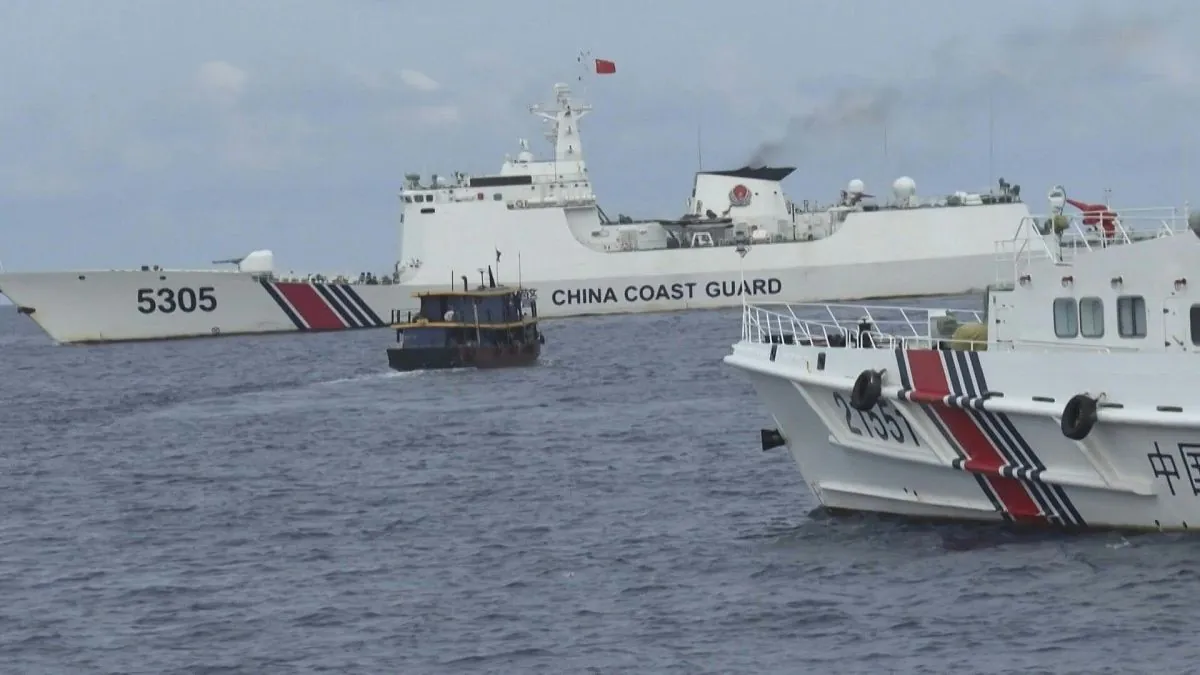US Condemns China's Actions in South China Sea Clash with Philippines
Recent maritime incident between China and Philippines near Sabina Shoal sparks US condemnation. Both nations accuse each other of ramming vessels, escalating tensions in the disputed South China Sea region.

The United States has expressed strong disapproval of China's recent actions in the South China Sea, following a maritime incident involving Chinese and Philippine coast guard vessels. The confrontation, which occurred on September 1, 2024, near the disputed Sabina Shoal, has further intensified the ongoing tensions in this strategically significant waterway.
The South China Sea, covering approximately 3.5 million square kilometers, has been a focal point of international disputes due to overlapping territorial claims. China asserts sovereignty over nearly the entire area, conflicting with claims by the Philippines, Brunei, Malaysia, Taiwan, and Vietnam. This vast expanse of water is not only rich in natural resources, with an estimated 11 billion barrels of oil and 190 trillion cubic feet of natural gas, but also serves as a crucial global shipping route, accommodating one-third of the world's maritime traffic.
According to Philippine officials, a Chinese coast guard vessel deliberately collided with their ship three times, causing damage to its bridge wing and freeboard. The incident took place within the Philippines' Exclusive Economic Zone (EEZ), which extends 200 nautical miles from its coastline as defined by the United Nations Convention on the Law of the Sea (UNCLOS).

In response, Matthew Miller, a spokesperson for the U.S. State Department, stated:
"The PRC's unlawful claims of 'territorial sovereignty' over ocean areas where no land territory exists, and its increasingly aggressive actions to enforce them, threaten the freedoms of navigation and overflight of all nations."
[[U.S. State Department Statement]]
The U.S. has reaffirmed its support for the Philippines, citing obligations under the U.S.-Philippines Mutual Defense Treaty signed in 1951. This incident marks the fifth confrontation between China and the Philippines in the past month, highlighting the escalating tensions in the region.
China, however, presents a different narrative. Liu Dejun, a spokesperson for the Chinese coast guard, claimed that it was the Philippine vessel that initiated the collision. China has called for the immediate withdrawal of Philippine forces from the Sabina Shoal, vowing to "resolutely thwart all acts of provocation, nuisance and infringement."
The South China Sea dispute has a complex history, with China's "Nine-dash line" claim and its construction of artificial islands since 2013 being major points of contention. In 2016, the Philippines won a case against China's claims at the Permanent Court of Arbitration, but enforcement remains challenging.
As tensions continue to rise, the potential for U.S. involvement in escorting Philippine ships has been discussed. Admiral Samuel Paparo, head of U.S. Indo-Pacific Command, recently stated that the U.S. is open to consultations with Manila regarding such operations. However, this move could potentially lead to direct confrontations between U.S. and Chinese naval vessels.
The ongoing situation in the South China Sea remains a critical issue in international relations, with significant implications for regional stability, global trade, and marine biodiversity. As nations continue to assert their claims and protect their interests, the need for diplomatic solutions and adherence to international law becomes increasingly urgent.


































